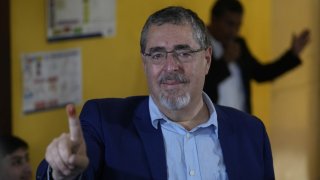
Outsider Bernardo Arévalo appeared to be the “virtual winner” of Sunday's election to be Guatemala’s next president after voters angry at widespread corruption and leaders’ failure to tackle it made a decisive choice for change.
A potential victory by the progressive candidate is almost certainly distressing politicians who have been enjoying impunity for corruption, along with some members of the monied elite and their allies in organized crime.
With more than 98% of the votes counted, the Supreme Electoral Tribunal reported that the son of former president Juan José Arévalo, representing the Seed Movement, led former first lady Sandra Torres by 58% to 36%.
Supreme Electoral Tribunal Magistrate Blanca Alfaro called Arévalo the “virtual winner” and called for an immediate national dialogue to begin to reconcile the country's deep political divides.
Get Tri-state area news delivered to your inbox.> Sign up for NBC New York's News Headlines newsletter.
President Alejandro Giammattei congratulated Arévalo in a tweet on X, the platform formerly known as Twitter. He invited Arévalo to begin an orderly transition the day after the results are certified.
Some of Arévalo’s supporters gathered at a plaza downtown in the capital waving flags and blowing horns.
Jhamy Lucas, 27, cried tears of joy in the Obelisk plaza. “I am so happy because I am going to be able to live in my country," she said. "I’m not going to have to migrate to survive.”
U.S. & World
Arévalo posted a brief message to X, saying “Long live Guatemala!”
The results are unlikely to be the last word: It took more than two weeks for the results of the first round of voting in June to be certified. Losing parties got the courts to intervene and order a review of precinct vote tallies.
When electoral authorities were finally ready to certify, the Attorney General’s Office announced an investigation into signatures that the Seed Movement had gathered to register years earlier as a party. That investigation continues, and prosecutors appear to be on a path to stripping Arévalo of his party.
Arévalo made it into the runoff with only about 654,000 votes or 11% of the total in the first round in June. On Sunday, he received more than 2.4 million.
The two candidates offered starkly different paths forward. Torres became an ally of the outgoing, deeply unpopular Giammattei in her third bid for the presidency. Arévalo, with the progressive Seed Movement, rode a wave of popular resentment toward politics to his surprise spot in the runoff.
But moves to drag the electoral process into the courts after the first round of voting in June led many Guatemalans to wonder what was to come between Sunday's results and the transfer of power Jan. 14.
Central America’s most populous country and the region’s largest economy continues to struggle with poverty and violence that have driven hundreds of thousands of Guatemalans to migrate to the U.S.
Voting appeared to have been peaceful. The Attorney General's Office, which sought unsuccessfully to suspend Arévalo's party before the vote, announced several arrests for interference with the process, but they appeared to be minor.
Political analyst Renzo Rosal noted the heavier than usual presence of uniformed agents from the Attorney General's Office at voting centers across the country “could be taken as a form of intimidation.” The Associated Press saw such agents at several voting centers.
Antonio González voted late Sunday, shortly before polls closed, at a teachers' school in the capital.
The 42-year-old tractor-trailer driver said he hoped Guatemala's powerful would respect the will of the voters. He wants someone to tackle corruption and improve education and the economy. Without those things, Guatemalans will continue to migrate to the U.S. like two of his co-workers recently had.
Thinking of the future of his children, he said, “We hope that they improve the economy, that there's work.”
Poll workers at each voting table immediately began tallying ballots. One person would unfold each ballot, show it to the party observers at the table and announce which party received the vote.
Earlier Sunday, Roxana Abigail González voted for Arévalo, hoping that he would make a difference for her future. “I think he could be a good president,” she said.
The 25-year-old student lives in Villa Nueva, a gritty hillside suburb above the capital. Thieves and gangs that extort businesses and kill those who don't pay roam its cratered streets. González said she has had the possessions she carried stolen multiple times, making her nervous to venture out alone.
Among her hopes for Guatemala's next government are more security, jobs for the poor families whose children she sees begging in the streets and more hospitals.
González wants to continue on to college and study business administration. She loves to cook and dreams of having her own restaurant one day, but the threat of extortion is so great that she's unsure if it's possible. “People can't keep a business,” she said.
At the school where she voted, the election coordinator estimated that by late morning the flow of voters was only about half of what they had for the first round of voting in June. Turnout was considerably lower at about 45% compared to 60% in June, according to electoral authorities.
The first round of voting on June 25 went relatively smoothly until Arévalo landed in the runoff. The fact that the preliminary results were dragged into Guatemala’s co-opted justice system has raised anxiety among many Guatemalans that voters will not have the final word Sunday.
Torres, in her closing campaign event Friday, suggested she would not accept a result that didn’t go her way. “We’re going to defend vote by vote because today democracy is at risk (and) because they want to steal the elections,” she said.
Torres has painted her opponent as a radical leftist who threatens Guatemalans’ conservative values on issues including sexual identity and abortion.
“We’re not going to let them influence our children with strange and foreign ideologies,” she said Friday.
Having run largely populist campaigns, capitalizing on her oversight of the government’s social programs during the presidency of her then-husband Álvaro Colom, Torres drifted sharply rightward this time, abandoning the social democratic history of her National Unity of Hope party and launching unsubstantiated attacks at Arévalo that she herself suffered during earlier failed campaigns.
Delmi Espino, a 46-year-old teacher, came to vote in Guatemala City with her mother. “It’s incredible how we managed to get to this point after everything that has happened in the electoral process,” she said. “How’s it possible that now there’s an investigation of one of the two parties?”
“It doesn’t matter that we need security, education or health, if you don’t fight corruption,” she said. “We want a president who cares about the country.”



